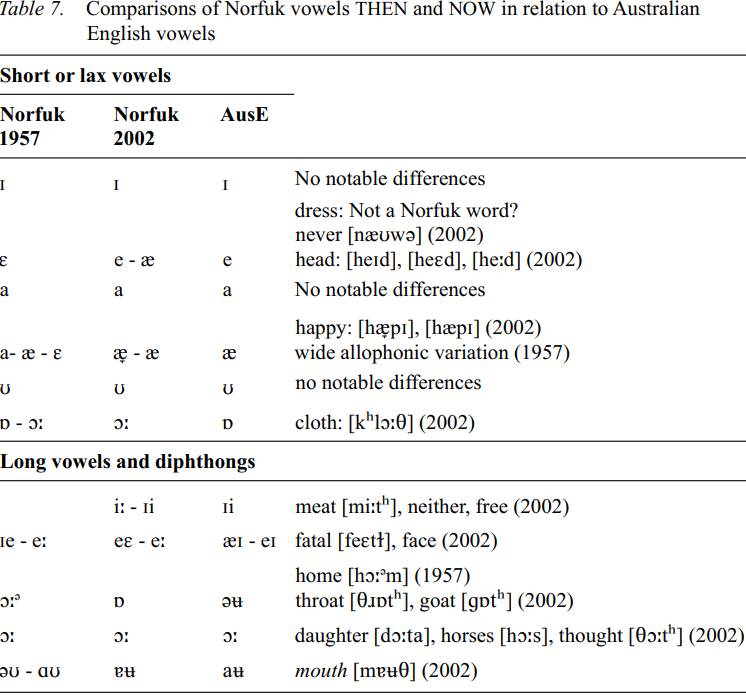
Vowel variation in contemporary Norfuk
 المؤلف:
John Ingram and Peter Mühlhäusler
المؤلف:
John Ingram and Peter Mühlhäusler
 المصدر:
A Handbook Of Varieties Of English Phonology
المصدر:
A Handbook Of Varieties Of English Phonology
 الجزء والصفحة:
796-43
الجزء والصفحة:
796-43
 2024-05-06
2024-05-06
 1223
1223
Vowel variation in contemporary Norfuk
From the keyword list a number of comparisons were attempted, to try to ascertain vowel shifts or lexical changes in pronunciation that may have taken place in Norfuk over the period of the late 1950s to the present day. These comparisons are summarized in Table 7 below. The data sets are too small for any but the most tentative observations. However, they generate some useful hypotheses to guide subsequent inquiry.
There is no evidence of substantial change in phonetic realization of the short lax vowels [ɪ- ε- a- ʊ] between the Flint samples from 1957 and the keyword sample from 2002. One might look for evidence that Norfuk [ε] has raised towards the Australian English equivalent ([e], bed). But this was apparent in only one token elicitation of dress, a word that is probably not part of Norfuk vocabulary. It is interesting to note that words in Norfuk which have cognate forms in standard English (e.g. never, head) are not only categorically distinct in length or vowel quality from the standard Australian or Norfolk English pronunciation, but are so in ways that represent alternative phoneme categories in standard English. This is what might be expected if Norfuk speakers were using standard English phonemic categories to differentiate lexical items of Norfuk from their cognates in standard English. Early Norfuk probably had no phonemic contrast between [ε] and [æ]. Note the wide variability in [æ ~ a] English-sourced Norfolk words from the Flint sample.

There is possibly a lesson here for teaching Norfuk to English speakers. In certain cases, an English word may be given ‘Norfuk’ color simply by substituting one English vowel phoneme for another. A similar case of phonemic mapping between standard English and Norfuk arises in cognate forms involving the back vowels /əʊ, ɔ:, ɒ/. These sounds are usually realized in Norfuk as long [ɔ:], often with a centering off-glide, or as short [ɔ:]. English source words containing /əʊ/ can flag their Norfuk status by phonemicizing as /ɔ:/ or /ɒ/.

In this way, as in the case of /e/ words discussed above, systematic substitutions by phonetically related sounds may be employed to mark the special status of Norfuk lexical items. Whether this is what in fact happens is a matter of speculation, but should be testable through further analysis of the phonetic forms and distributions of these sounds in the Flint corpus and further elicitation of contemporary speech samples.
 الاكثر قراءة في Phonology
الاكثر قراءة في Phonology
 اخر الاخبار
اخر الاخبار
اخبار العتبة العباسية المقدسة


